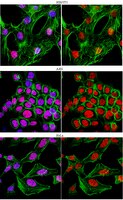Berberine, a genotoxic alkaloid, induces ATM-Chk1 mediated G2 arrest in prostate cancer cells.
Yu Wang,Qiao Liu,Zhaojian Liu,Boxuan Li,Zhaoliang Sun,Haibin Zhou,Xiyu Zhang,Yaoqin Gong,Changshun Shao
Mutation research
734
2012
Show Abstract
Berberine has been shown to possess anti-tumor activity against a wide spectrum of cancer cells. It inhibits cancer cell proliferation by inducing cell cycle arrest, at G1 and/or G2/M, and apoptosis. While it has been documented that berberine induces G1 arrest by activating the p53-p21 cascade, it remains unclear what mechanism underlies the berberine-induced G2/M arrest, which is p53-independent. In this study, we tested the anti-proliferative effect of berberine on murine prostate cancer cell line RM-1 and characterized the underlying mechanisms. Berberine dose-dependently induced DNA double-strand breaks and apoptosis. At low concentrations, berberine was observed to induce G1 arrest, concomitant with the activation of p53-p21 cascade. Upon exposure to berberine at a higher concentration (50μM) for 24h, cells exhibited G2/M arrest. Pharmacological inhibition of ATM by KU55933, or Chk1 by UCN-01, could efficiently abrogate the G2/M arrest in berberine-treated cells. Downregulation of Chk1 by RNA interference also abolished the G2/M arrest caused by berberine, confirming the role of Chk1 in the pathway leading to G2/M arrest. Abrogation of G2/M arrest by ATM inhibition forced more cells to undergo apoptosis in response to berberine treatment. Chk1 inhibition by UCN-01, on the other hand, rendered cells more sensitive to berberine only when p53 was inhibited. Our results suggest that combined administration of berberine and caffeine, or other ATM inhibitor, may accelerate the killing of cancer cells. | 22561209
 |
Role of progerin-induced telomere dysfunction in HGPS premature cellular senescence.
Benson, EK; Lee, SW; Aaronson, SA
J Cell Sci
123
2605-12
2010
Show Abstract
Hutchinson-Gilford Progeria Syndrome (HGPS) is a premature-aging syndrome caused by a dominant mutation in the gene encoding lamin A, which leads to an aberrantly spliced and processed protein termed progerin. Previous studies have shown that progerin induces early senescence associated with increased DNA-damage signaling and that telomerase extends HGPS cellular lifespan. We demonstrate that telomerase extends HGPS cellular lifespan by decreasing progerin-induced DNA-damage signaling and activation of p53 and Rb pathways that otherwise mediate the onset of premature senescence. We show further that progerin-induced DNA-damage signaling is localized to telomeres and is associated with telomere aggregates and chromosomal aberrations. Telomerase amelioration of DNA-damage signaling is relatively rapid, requires both its catalytic and DNA-binding functions, and correlates in time with the acquisition by HGPS cells of the ability to proliferate. All of these findings establish that HGPS premature cellular senescence results from progerin-induced telomere dysfunction. Full Text Article | 20605919
 |
The effects of G2-phase enrichment and checkpoint abrogation on low-dose hyper-radiosensitivity.
Sarah A Krueger,George D Wilson,Evano Piasentin,Michael C Joiner,Brian Marples
International journal of radiation oncology, biology, physics
77
2010
Show Abstract
An association between low-dose hyper-radiosensitivity (HRS) and the early G2/M checkpoint has been established. An improved molecular understanding of the temporal dynamics of this relationship is needed before clinical translation can be considered. This study was conducted to characterize the dose response of the early G2/M checkpoint and then determine whether low-dose radiation sensitivity could be increased by synchronization or chemical inhibition of the cell cycle. | 20637979
 |
BCR-ABL gene expression is required for its mutations in a novel KCL-22 cell culture model for acquired resistance of chronic myelogenous leukemia.
Hongfeng Yuan,Zhiqiang Wang,Chunggang Gao,Wengang Chen,Qin Huang,Jiing-Kuan Yee,Ravi Bhatia,WenYong Chen
The Journal of biological chemistry
285
2010
Show Abstract
Acquired resistance through genetic mutations is a common phenomenon in several cancer therapies using molecularly targeted drugs, best exemplified by the BCR-ABL inhibitor imatinib in treating chronic myelogenous leukemia (CML). Overcoming acquired resistance is a daunting therapeutic challenge, and little is known about how these mutations evolve. To facilitate understanding the resistance mechanisms, we developed a novel culture model for CML acquired resistance in which the CML cell line KCL-22, following initial response to imatinib, develops resistant T315I BCR-ABL mutation. We demonstrate that the emergence of BCR-ABL mutations do not require pre-existing BCR-ABL mutations derived from the original patient as the subclones of KCL-22 cells can form various BCR-ABL mutations upon imatinib treatment. BCR-ABL mutation rates vary from cell clone to clone and passages, in contrast to the relatively stable mutation rate of the hypoxanthine-guanine phosphoribosyltransferase gene. Strikingly, development of BCR-ABL mutations depends on its gene expression because BCR-ABL knockdown completely blocks KCL-22 cell relapse on imatinib and acquisition of mutations. We further show that the endogenous BCR-ABL locus has significantly higher mutagenesis potential than the transduced randomly integrated BCR-ABL cDNA. Our study suggests important roles of BCR-ABL gene expression and its native chromosomal locus for acquisition of BCR-ABL mutations and provides a new tool for further studying resistance mechanisms. Full Text Article | 20007699
 |











